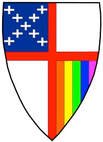Our Worship Tradition
In the Episcopal Church we have an ancient liturgy that has been handed down through the ages with revisions over the centuries. We currently use the 1979 Book of Common Prayer for our official worship services. We also have supplementary books that are approved for use for special or occasional services.
On Sundays we offer two forms of the Eucharist
We gather for scripture readings, psalms, prayers of the people, a short sermon, and to receive communion.
Rite I refers to a service offered with traditional language. We use this service on Sundays at the 8 a.m. Eucharist. In this service we use "thees" and "thous." These pronouns are actually very intimate addresses to God. This is a quiet service with out music or singing.
Rite II refers to the service offered with more contemporary language, used on Sundays at the 10 a.m. Eucharist. We generally are accompanied by an organist and sing hymns together.
What is Liturgy -From the National Episcopal Church Website
"Liturgy is sacramental. Outward and visible realities are used to express the inward and spiritual realities of God’s presence in our lives. Liturgy reflects the belief of incarnational theology that tangible and finite things may reveal divine grace and glory. By the Spirit, through liturgy, the church manifests the love of God and the unity we share in Christ. This loving unity was shared by the Father and the Son, and it is offered to all Christian believers. Liturgy is a public and social event. It engages our lives and faith, our thoughts, feelings, hopes, and needs-especially our need for salvation in Christ. Liturgy includes actions and words, symbols and ritual, scriptures and liturgical texts, gestures and vestments, prayers that are spoken or sung. It is also shaped by the seasons, feasts, and fasts of the calendar of the church year and the lectionaries for the Holy Eucharist and the Daily Office (BCP, pp. 15-33, 888-1001). Liturgy is to involve the various members and ministries of the church so that all are drawn together into one living expression of divine worship. It expresses what we believe and know about God, including belief and knowledge that cannot be completely stated in words."
On Sundays we offer two forms of the Eucharist
We gather for scripture readings, psalms, prayers of the people, a short sermon, and to receive communion.
Rite I refers to a service offered with traditional language. We use this service on Sundays at the 8 a.m. Eucharist. In this service we use "thees" and "thous." These pronouns are actually very intimate addresses to God. This is a quiet service with out music or singing.
Rite II refers to the service offered with more contemporary language, used on Sundays at the 10 a.m. Eucharist. We generally are accompanied by an organist and sing hymns together.
What is Liturgy -From the National Episcopal Church Website
"Liturgy is sacramental. Outward and visible realities are used to express the inward and spiritual realities of God’s presence in our lives. Liturgy reflects the belief of incarnational theology that tangible and finite things may reveal divine grace and glory. By the Spirit, through liturgy, the church manifests the love of God and the unity we share in Christ. This loving unity was shared by the Father and the Son, and it is offered to all Christian believers. Liturgy is a public and social event. It engages our lives and faith, our thoughts, feelings, hopes, and needs-especially our need for salvation in Christ. Liturgy includes actions and words, symbols and ritual, scriptures and liturgical texts, gestures and vestments, prayers that are spoken or sung. It is also shaped by the seasons, feasts, and fasts of the calendar of the church year and the lectionaries for the Holy Eucharist and the Daily Office (BCP, pp. 15-33, 888-1001). Liturgy is to involve the various members and ministries of the church so that all are drawn together into one living expression of divine worship. It expresses what we believe and know about God, including belief and knowledge that cannot be completely stated in words."
We Would Love to Have You Visit Soon!
WE ARE ALL MADE IN THE IMAGE OF GOD |
Telephone845-635-2854
|
|

